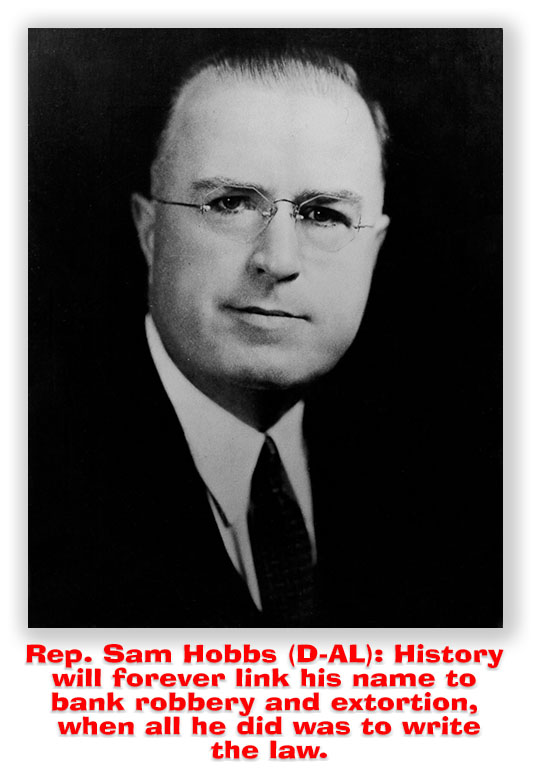We post news and comment on federal criminal justice issues, focused primarily on trial and post-conviction matters, legislative initiatives, and sentencing issues.

ONE UP, ONE DOWN ON § 924
Two Circuits checked in last week on crimes of violence and 18 USC § 924, the statute that mandates a consecutive mandatory minimum sentence when a gun is possessed or used during drug or violent offenses. When the dust settled, defendants went one-and-one.
 If 924(c) Is Vacated, 924(j) Must Be, Too: In 2018, Dwaine Colleymore pleaded guilty to four criminal charges stemming from an attempted robbery, during which he fatally shot a man. Dwaine pleaded guilty to (1) conspiracy to commit Hobbs Act robbery in violation of 18 USC § 1951; (2) attempted Hobbs Act robbery in violation of 18 USC § 1951 and 2; (3) discharging a firearm during and in relation to a crime of violence in violation of 18 USC § 924(c); and (4) murdering a person with a firearm during and in relation to a crime of violence in violation of 18 USC § 924(j)(1). The judge sentenced him to 525 months (43+ years).
If 924(c) Is Vacated, 924(j) Must Be, Too: In 2018, Dwaine Colleymore pleaded guilty to four criminal charges stemming from an attempted robbery, during which he fatally shot a man. Dwaine pleaded guilty to (1) conspiracy to commit Hobbs Act robbery in violation of 18 USC § 1951; (2) attempted Hobbs Act robbery in violation of 18 USC § 1951 and 2; (3) discharging a firearm during and in relation to a crime of violence in violation of 18 USC § 924(c); and (4) murdering a person with a firearm during and in relation to a crime of violence in violation of 18 USC § 924(j)(1). The judge sentenced him to 525 months (43+ years).
Dwaine was still on appeal when the Supreme Court decided United States v. Taylor last June. Last week, the 2nd Circuit reversed his §§ 924(c) and 924(j) convictions.
The Circuit ruled that after Taylor, attempted Hobbs Act robbery no longer qualifies as a crime of violence under § 924(c)(3)(A) “and therefore cannot serve as a predicate for Dwaine’s conviction under § 924(c)(1)(A). Furthermore,” the 2nd said, because an element of a § 924(j) murder offense is that the defendant killed someone ‘in the course of a violation of [924(c)],’ attempted Hobbs Act robbery also cannot serve as a predicate for Dwaine’s conviction under § 924(j)(1).”
“Having given due consideration to Taylor,” the Circuit held, “we vacate Colleymore’s convictions on Counts Three and Four.” The case was remanded to the district court for resentencing.
 Beating the ACCA Like a Rented Mule: The 7th Circuit last week embarked on an exercise in pretzel logic to conclude that Hobbs Act robbery itself is crime of violence under the Armed Career Criminal Act.
Beating the ACCA Like a Rented Mule: The 7th Circuit last week embarked on an exercise in pretzel logic to conclude that Hobbs Act robbery itself is crime of violence under the Armed Career Criminal Act.
Lavelle Harley argued that while § 924(c) defined a crime of violence as physical force against a person or property, the ACCA (18 USC 924(e)(2)) defined a crime of violence as physical force against a person only.
That should have ended matters. After all, a Hobbs Act robbery can be committed “by means of actual or threatened force, or violence, or fear of injury, immediate or future, to [a victim’s] person or property” 18 USC § 1951(b)(1). So it’s pretty clear that Hobbs Act robbery is not a crime of violence under the ACCA (although it is under 924[c]).
That wasn’t the result the 7th Circuit wanted. “We have to look beyond the force clause,” the 7th said, “to determine if Hobbs Act robbery committed using force against property qualifies as a violent felony under some other provision of ACCA.”
Under the ACCA‘s “enumerated clause,” extortion is listed as a crime of violence. “The question,” the Circuit explained, “then becomes whether a conviction of Hobbs Act robbery for using force against property fits within ACCA extortion.”
 The Circuit halfway admitted it was using smoke and mirrors, noting that “a careful reader may be pausing at this point and questioning why we are using the generic definition of extortion to interpret ACCA’s enumerated clause when the Hobbs Act provides its own, similar definition… But remember the question we are trying to answer and the analysis that the categorical approach requires. We look to the Hobbs Act only to understand the elements of Hobbs Act robbery, the prior conviction at issue here. Once we understand those elements, our focus turns to ACCA… We assess whether each way of committing Hobbs Act robbery fits within ACCA’s definition of ‘violent felony’ in § 924(e)(2)(B). Put most simply, the Hobbs Act does not tell us what constitutes extortion under ACCA. That answer has to come from ACCA itself.”
The Circuit halfway admitted it was using smoke and mirrors, noting that “a careful reader may be pausing at this point and questioning why we are using the generic definition of extortion to interpret ACCA’s enumerated clause when the Hobbs Act provides its own, similar definition… But remember the question we are trying to answer and the analysis that the categorical approach requires. We look to the Hobbs Act only to understand the elements of Hobbs Act robbery, the prior conviction at issue here. Once we understand those elements, our focus turns to ACCA… We assess whether each way of committing Hobbs Act robbery fits within ACCA’s definition of ‘violent felony’ in § 924(e)(2)(B). Put most simply, the Hobbs Act does not tell us what constitutes extortion under ACCA. That answer has to come from ACCA itself.”
But the Hobbs Act does define extortion, saying it is “the obtaining of property from another, with his consent, induced by wrongful use of actual or threatened force, violence, or fear, or under color of official right.”
Nevertheless, the 7th Circuit managed to conclude that “generic extortion encompasses Hobbs Act robbery using force against property. Make no mistake, the analysis is difficult, and the issue is close.”
 The decision flies in the face of the rules of statutory construction, which say that when one definition in a single statute’s subsection differs from a definition in another subsection, Congress must be presumed to have intended the distinction. But the 7th Circuit intended to hold that a Hobbs Act robbery was a crime of violence for purposes of the ACCA, and through an intellectually dishonest opinion, did exactly that.
The decision flies in the face of the rules of statutory construction, which say that when one definition in a single statute’s subsection differs from a definition in another subsection, Congress must be presumed to have intended the distinction. But the 7th Circuit intended to hold that a Hobbs Act robbery was a crime of violence for purposes of the ACCA, and through an intellectually dishonest opinion, did exactly that.
United States v. Collymore, Case No 19-596, 2023 USAppLEXIS 5388 (2d Cir, Mar 7, 2023)
United States v. Hatley, Case No 21-2534, 2023 USAppLEXIS 5290 (7th Cir, Mar 6, 2023)
– Thomas L. Root



